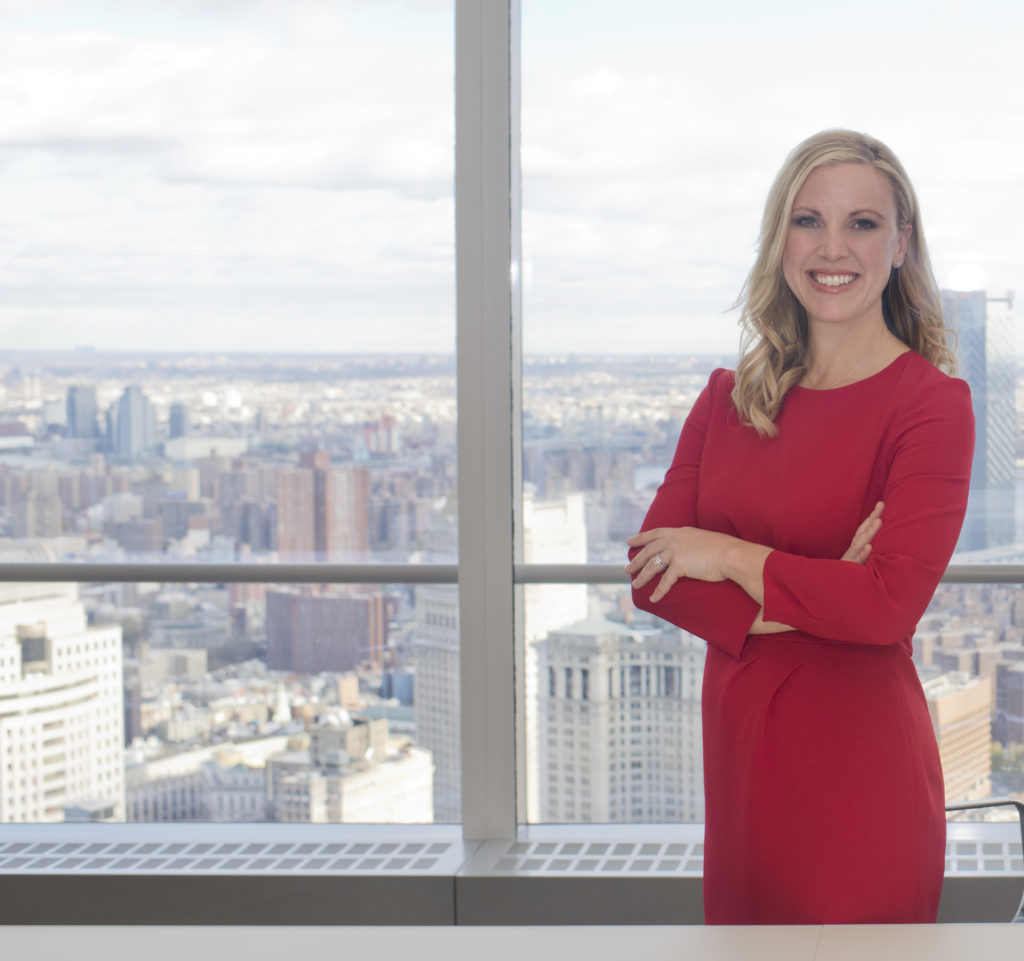Joan Kuhl has spent her career trying to make workplaces better for millennial women. After 14 years in the pharmaceutical industry, Kuhl launched Why Millennials Matter, a training, research, and consulting company that focuses on raising awareness about the value of investing in the early career workforce and advancing women in the workplace. She recently published the career advice book Dig Your Heels In: Navigate Corporate BS and Build the Company You Deserve.

What inspired you to write Dig Your Heels In? What was your career path?
I grew up in Pennsylvania, and for a chunk of my childhood it was just my mom and I. That clearly had an influence on both of our lives. Here are two things I learned that connect to my work today.
I watched my mom take some risks in order to develop herself…for her it was to get better jobs so we could have a brighter future. Going from being an inner city Philadelphia teacher to being a secretary with multiple jobs, including one at Temple University so she could further her education, then even logging miles for her pilot’s license with me on a stack of telephone books next to her in the co-pilot seat so she could open the door to becoming an air traffic controller…a completely traditional male dominated field but it tripled her income. So she was able to build enough savings to move us out of my grandparents’ home and buy an apartment. But, guess what? The bank added 2.5 percent points onto her loan. When I think about the wage gap that still exists today for women, it frustrates me that all these other experiences we have as women, as consumers and as talent in the workforce, are plagued with gender bias.
When people asked me what I wanted to be as I grew up, I would say “ I want to wear a business suit and work in New York City!” Bold, but no more specific than that. But my mom didn’t know anyone who wore a suit or anyone who worked and lived in NYC. So she enrolled me in youth leadership programs where I could have access to mentors, the professionals that volunteered, who most likely did wear suits and could possibly have worked in NYC. This why I’ve been long-time volunteer and board member of organizations that support girls like Girls Hope of Pittsburgh, Girl Scouts, Step Up for Women, Girls on the Run, and Girls Inc. of New York City. Mentorship and relationships that give encouragement and support to rising leaders is critical.
I launched my corporate career in the pharmaceutical industry and continued to stay involved on campus as a mentor and speaker for over 13 years until I launched Why Millennials Matter full time in later 2014. The mission was to help companies understand, engage and retain the next generation of global workers and consumers.
That year of launch, I also traveled the world from Argentina to South Africa with Cosmopolitan. I became the career expert for Barnes & Noble College who manages 750 college campus bookstores with over 5 million students in their network. I led on campus and digital workshops and created a toolkit for faculty to advise students on their career and a playbook for students.
Then in 2015, I was subcontracted as the project manager for a research initiative with the Center for Talent Innovation to work with Eli Lilly and Company, who happened to be my first employer. I had strong relationships and a lot of intel. The Women’s Employee Journey opened my eyes to the dire need to more actively support women in the workplace.
The Women’s Employee Journey explored the factors contributing to the decline in representation of women at senior levels of leadership. In addition to this project, I launched several research initiatives inside large corporations and inside top 20 business schools. As I interviewed women at various career stages including women executives who had chosen to stay with their company for the long haul, I heard stories of struggle and sacrifice. I looked up to these women but their stories blew me away me. They were far from thriving, they were barely surviving.
The thread through all this work is the clear need to create a more equitable and inclusive workplace for women at all levels. Honestly what Millennials Want is what women deserve! So if we help today’s working women thrive, then we open the door for a more attractive, engaging workplace for the next generation. I am the mother of two daughters so I believe their generation deserves a brighter future as much as I do, you do…all of us.
What has been the biggest challenge and, on the flip side, the biggest reward of starting Why Millennials Matter?
When you see something so clearly, a gap, an opportunity, it is quite jarring when you constantly have to prove it over and over again. In my situation, the first quest I was on revolved around helping leaders and organizations see the power and potential of rising professionals and the extraordinary way they approached work and life to build stronger relationships at work. The current mission of advocating for women in the workplace and girls leadership has even more research to support it as a critical and urgent opportunity. Yet over and over again, I am confronted with the biased beliefs that this is just a “nice thing to do” not the absolute smartest thing for everyone. The rewarding side for me is when I see men and women side by side acknowledging the real everyday challenges and expressing the determination to disrupt it together. And when I see women hold their ground and go after what they deserve while telling the world around them what it feels like to take those risks and inspire others to stand up and speak out too.
What are your responsibilities as president and founder of Why Millennials Matter?
There is not enough time and space to list out the infinite responsibilities you take on when you become a founder and pursue a business that is based around your own perspective of what the world needs from your talents. Every day for me is different. I work crazy, unpredictable hours because I also strive to be present for my two daughters and the demands of their schedule and my husband’s. It is a hamster wheel, but I am not someone who ever liked sitting still. I want a full life at home and at work so this is the path I chose for myself. Hustling and using my grit to strategize, sell, and drive an impact through my work never gets easier and I always wonder if everyone else has it figured out. Until…I make the time to get together with other working moms through organizations like #HeyMama, @TheWing, @BeALuminary, @TheRiveter, @ForbesWomen, Book Clubs, @TheSpaghettiProject…the list goes on of new communities built by women for women. When I make the time for these gatherings or to spend time in these spaces, wow, it does wonder for my energy and empathy toward myself. It refuels me and reminds me that no one has it figured out and everyone is doing their best to make this one life we are given something to remember and be proud of. I’m so proud of the work I am leading now and really ready to roll up my sleeves to help women navigate their big decisions at work to help us make the progress we need in our culture so we can thrive.
What are the most important characteristics someone needs to have to be successful in your role?
It is absolutely critical to, “Lift as you climb.” This is a core value for my leadership style and I’m intentional about making time for women at earlier stages of their life and career even while I am still struggling to figure out my own. They need to see, feel, and hear what you are going through and what you are learning to empower them to build the endurance to keep pushing for what they want too. Don’t let other women pursue their dreams with rose colored glasses. It is much more rewarding to have your eyes wide open and be given the time to build up the courage and skills to be ready for the barriers we all will undoubtedly face in our professional careers and personal lives.
Congratulations on your new book, “Dig Your Heels In”! How did you choose the topic?
Once I realized that we needed to go beyond empowering women and start to really break apart the systems to shake out the bias and evolve to be what she needs, I began to lean in to my Courage To Stay brand. More than ever, today’s businesses are primed for disruption and progress. It’s important for women to take hold of the momentum created by the #MeToo movement that has opened everyone’s eyes to the discrimination and bias women face at all levels and industries.
Women everywhere are raising their voices individually against inequality. Imagine what we could do if we collectively dug our heels in and used our influence and enterprise knowledge to begin creating change within our organizations? It’s pretty obvious that the business world is unfair to women—the pay gap alone speaks very clearly to that fact as do the lack of national policies around paid parental leave. We’re past the stage of awareness; now it is time to do the work to create the companies we deserve and that deserve us.
What are the top three takeaways you want people to have after reading “Dig Your Heels In”?
How each woman can create a vision for her career and their company that breaks barriers (both in their mind and systemic) with exercises, action lists, scripted responses, and relevant case studies with stories from the women digging their heels in to get the career they desire and build the company they deserve.
How to change your workplace culture from within, rather than career hopping, for the betterment of all women in the workplace with testimonials from female trailblazers offering actionable advice for those who aren’t sure where to start.
How to overcome self-limiting behaviors like imposter syndrome and good girl thinking that hold women back.
What’s the biggest lesson you learned at work and how did you learn it?
After a series of disappointing exchanges with one of my senior leaders back in the days of my corporate career, I was ready to walk right out the door forever. Two months earlier, I had been asked to develop and facilitate a two-day training program on cystic fibrosis, a disease state that had actually killed two members of my family before they both turned thirty-five years old. Had I been tapped intentionally as an opportunity to invite my personal experiences into the learnings and help the company leverage my insights to better serve patients and our colleagues who would be working on a drug to treat it? Nope, it was purely a coincidence. But, nonetheless, I still approached senior leaders suggesting that during the training sessions we open up the dialogue to include the journey of families who had also encountered this disease and share its impact. Regrettably, I was told to stick to the “science” and not involve my experience. This was all about “execution, not inspiration.” I felt a really strong disconnect between my personal experiences and how it was leveraged to influence the work or services of my company. I think this is a pretty common scenario for most women who want to bring their perspective into the business and use it for innovation and a closer connection to the people they serve through that business’s products and services.
When I met Amanda Apodaca who shares her story in “Dig Your Heels In” it became so obvious that this is not an isolated experience. This is collectively what women are facing when they can’t bring their whole self to work and continue their perspective at all levels of decision making. Check out Amanda Apodaca’s story in chapter four to learn how to build an internal network of advocates based around the mission of disrupting bias and embedding diversity and inclusion into every aspect of your company.
What is one thing that you wish you had known when you were starting out your career?
I wish I had been more aware of the power of storytelling and been more vulnerable about sharing my own. Our stories and our visibility shape perceptions beyond those of men and women currently in the workforce. They have the power to influence our communities and our children. When your story is one of breaking down old structures and gender biases to create a more equitable playing field, you empower other women to do the same. What is more, you lift up the next generation of girls and women to achieve more under even better working conditions.
What is the best advice you’ve ever received?
Take control of your own growth and development! Did you know that businesses invest only about $1,200 per person in developing their youngest employees? That means in many cases companies are spending more money on an employee’s computer than on their growth and development! That means it is up to you from day one to seek out opportunities to advance your knowledge and skill acquisition.
For women in the first decade of their career, I see a critical opportunity to pursue opportunities that will stretch their skills, increase their knowledge, and expand their context so they can thrive in the next decade when life priorities start to play a bigger role. I recommend they learn as much as they can about how their companies invest in leadership development then set up meetings with human resources to express their interest and dedication to grow as a leader within the organization. I tell them to come prepared for those meetings to discuss options like conferences, local training programs or participating in external professional groups, focusing on the “what’s in it for the company” angle.
The single greatest development opportunity I see for young women is volunteering and devoting time on non-profit boards. Why? Because it gives them the chance to take on much higher-level responsibilities than are typically available to early career professionals at organizations that desperately need the help.
What is your business advice for other young professional women?
You deserve to be paid more, and that goes beyond salary. You need to evaluate and understand your full compensation details. Ask for help. Reach out to other women who can help you better understand the information and get a stronger grip on your situation. We have to, “get pay straight” beginning with being really clear on what we have and what we deserve. Here are the first two steps I offer in “Dig Your Heels In” for taking on this process:
- Begin with assessing your true worth and market value. Please know that this is not the salary.com way, which you can use as a starting point but which will not give you a thorough assessment of your breadth of experience, education, and role responsibilities. You must map out all these pieces yourself and list out your pay along with benefits to be firm in preparing to negotiate tactfully and effectively.
- You need to do some legwork to understand how financial rewards are calculated and distributed in your company. This requires reading anything made available to you at your current level, scheduling an appointment with HR, and engaging in open discussions with your manager. You may find the thought of such efforts stressful or frightening, but you have to break the cycle and initiate these conversations. If it makes you feel more comfortable, think about these initial discussions as regarding company compensation processes and not your specific situation. To gain a stronger understanding of how your chosen career path will affect your pay, you want to learn as much as you can about the impact of level, department, and tenure on pay and benefits. Putting together all the facts about your own compensation (what you are paid and what you believe the compensation should be for your level and productivity, given your company’s policies) will put you in the driver’s seat for a direct conversation about pursuing an increase.































